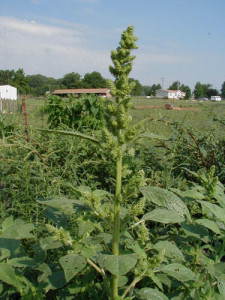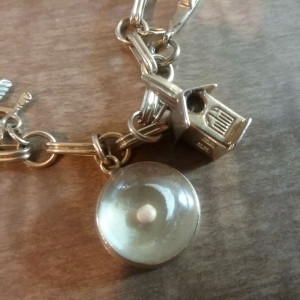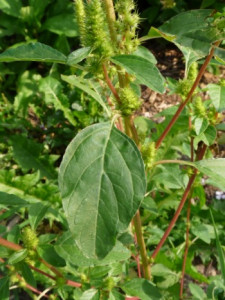“Good Weeds?”
Rev. Neil Wilson
The Congregational Church of the United Church of Christ,
Bradford, Vermont
July 23, 2017
Matthew 13: 24-30, 36-43
 I was tempted to title this morning’s message “Some Good Weed” without the question mark, but didn’t want anyone to get the wrong impression!
I was tempted to title this morning’s message “Some Good Weed” without the question mark, but didn’t want anyone to get the wrong impression!
One doesn’t have to listen to much evening news to realize that this world of ours can be a scary place, full of war, famine, natural disasters, corruption and violence, state sponsored and individual but most of all perhaps, too much indifference to all these! While there is much evil there is also great beauty and moments of tremendous grace.
We live in a world of paradox, where people who love their families but will not hesitate to kill the members of other families who they consider a threat.
Good people still struggle and die while evil ones thrive.
Infants and children die of hunger every day, while dictators and oppressors live full and healthy lives.
How did this happen? Didn’t our Maker sow good seeds? Didn’t the Creator deem everything “good” in the beginning? Where, then, did all this evil come from?
Like Esau, we might feel that a conniving brother has somehow cheated us out of our worldly blessings. We begin to wonder how so many weeds sprung up in this garden.
Even in our anxiety over the weeds in life, we get a little excited when we hear this parable. There are weeds in the garden? No problem! I’ve got my gloves and hoe right here, let’s take care of them before they get out of hand!
Behind our enthusiasm is a self-certainty that we can tell the difference between a weed and wheat, between good people and less desirable ones.
But Jesus puts a damper on our enthusiasm. He calls us to leave the weeds among the wheat – let the good and the evil grow together. We just might not be wise enough to know the difference between what is good and what is evil.
What we call weeds, God may see differently – only God can finally judge anyone, or anything, or any situation in our world. If we appoint ourselves as judges, the chances are we may destroy some of the good in this world.
I assume many of you are gardeners.
When it comes to gardening what is your definition of a weed?
Something that grows where you do not want it to?
Is it a weed because it is of little or no food value?
Is it something we deem to be ugly, useless, even harmful?
It is a weed because if left unchecked it will spread out of control?
It seems to me that a weed is something we’ve determined we do not want where it is growing.
Did you know that there are instances where corn is considered a weed? (Midwestern farmers see what it called “volunteer” corn in the fields of soybeans is eradicated by the debatable use of Roundup)
Pigweed also known as Lambs Quarter is a wonderful spinach-like addition to salads.
What is an unsightly invasion of yellow to the lawn fanatic is a field filled with beauty bouquets for Mom or Dad to a child.
Now to be sure there are invasive species that are very problematic. Milfoil in our lakes for example. And what about Asian Carp in the Illinois River which is connected to Lake Michigan through the Chicago Sanitary and Ship Canal. A series of electric barriers are in place to prevent the carp from entering the Great Lakes.
Mint can take over your herb garden and then your lawn. An example of a good plant becoming a weed?
Yet God can transform the ugly in the world to things of beauty. Gang members that become mentors to youth, former drug abusers become counselors. I do not know about you, but I’m glad it’s God who does the final judging and not me.
But still, how quick I am to judge! Whenever someone flies past me on the highway, I say “Where are the troopers?” And let’s be honest, like me, you take a certain amount of pleasure when in a mile or two there they sit beside the road with a police officer busily writing out a ticket! We want to be there when justice in meted out. I want to drive by and just smile.
In fact, if it were up to me, doing such things in traffic would get them all thrown in the prison for a while. And then, just around the next corner… I find myself not living by my own rules! Thank God, it is not up to me!
We want to see people get their comeuppance, don’t we? We want the speeder nailed, the thief punished, the cheater caught, the murderer condemned. We want our thirst for vengeance satisfied. We’re so stuck on this idea in our culture that we produce and patronize movie after movie on just such a theme – the bad guy getting his/her due – usually violently.
You see there are not just weeds in the world, but weeds in our own hearts. The Apostle Paul told the Romans that it’s not just the whole creation that groans in pain, but we do as well. We groan inwardly while we wait for redemption, restoration not just for this world but for ourselves.
Vengeance is just one of those weeds; there are others: pride, envy, gluttony, dishonesty, indifference, cheating, lying, anger. They’re all there – within each of us – weeds among the wheat of our good works, our good thoughts, our love, our caring, our compassion, and our hope.
Bookstores have shelves of self-help books we buy (and sometimes read) to help us weed our inner gardens, but often the weeds seem to grow back after a while don’t they.
Here’s a thought, what if, every once in a while we stopped and gave thanks for some of these weeds instead of trying to rip all of them up by the roots?
Our anger at times can cause great pain but also great joy. Anger has harmed relationships, driven people we love away, held us hostage, and caused damage to people and things. But it is also in learning to deal with this weed of anger that we can grow to be stronger, healthier, and happier. We can learn the art of forgiveness, of compassion, and self-control. That good weed of anger has also gotten some of us involved in causes that seek to make the world a better place – that seek to make the good wheat stronger.
Think of your own weeds. Think of those things about yourself that you’re ashamed of, that you don’t want anyone to know about. Think about your weaknesses, your addictions, your guilty pleasures.
Most of the time it isn’t possible to just yank them out, is it. But they can challenge you to grow stronger, to make your wheat outgrow all the weeds in your inner garden.
In a former life and career as a logger, I did a fair amount of timber stand improvement work. The object of such work is to harvest the poor quality and less desirable trees (sometimes actually called “weed” trees) to release the higher quality/value crop trees allowing them to grow to a greater girth and height quicker.
But one had to be especially careful not to cut away all the lower quality “weed” trees for you could do more harm. The crop trees needed these “lesser” trees to protect them from strong winds and these so-called weed trees would compete with the crop trees for sunlight forcing them to grow taller, straighter and with fewer limbs thus fewer knots in the lumber.
In the end, the lesson from scripture and logging is nothing all that amazing or new:
Judge not lest you also be judged. Cast not the first stone. We cannot always see the end result, only God can. So, leave it to God to take care of most things.
Use the occasional weeds that pop up in our lives, those perceived as problems, wisely and you will find that God can redeem them – and out of them perhaps even create something beautiful in our lives. After all, this is what God does!
In the end, these are my thoughts on Jesus’ parable. I encourage you to consider them and ponder your own.
Amen.




